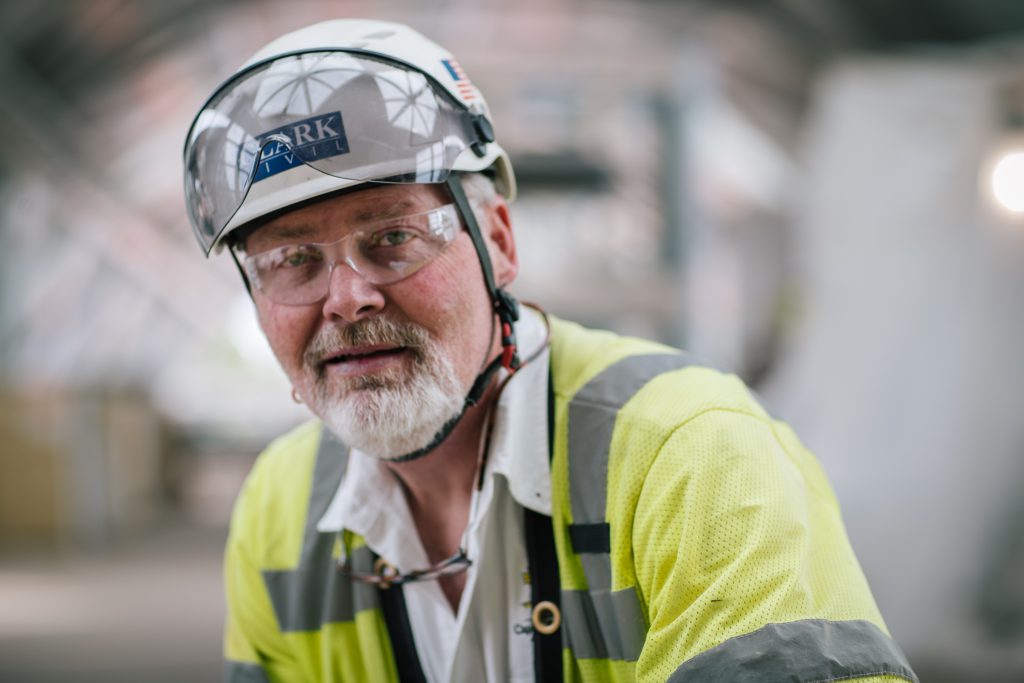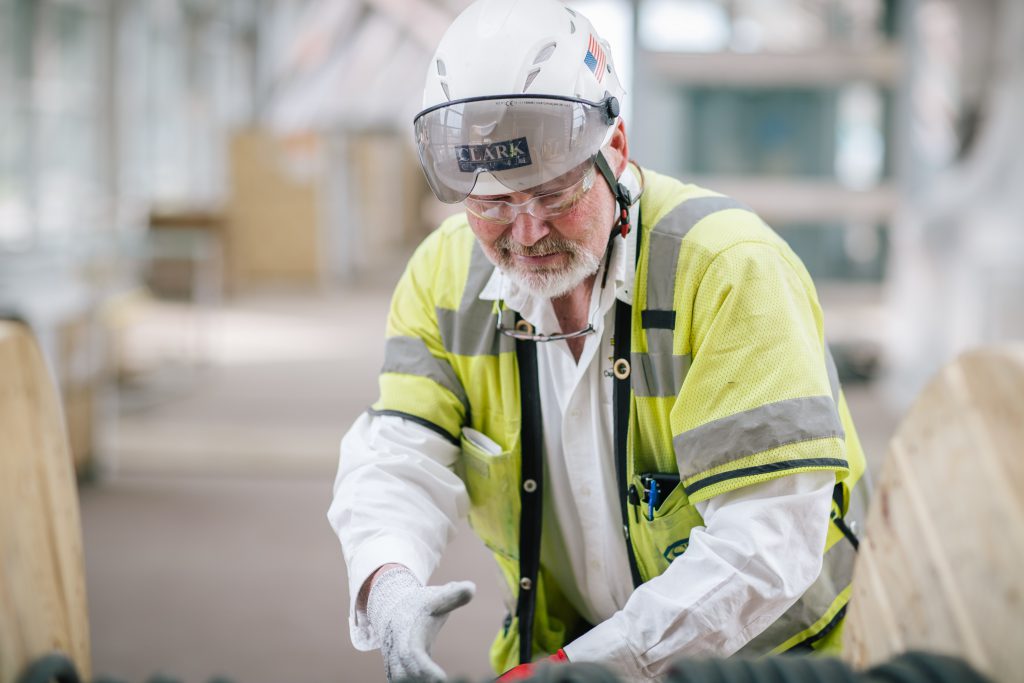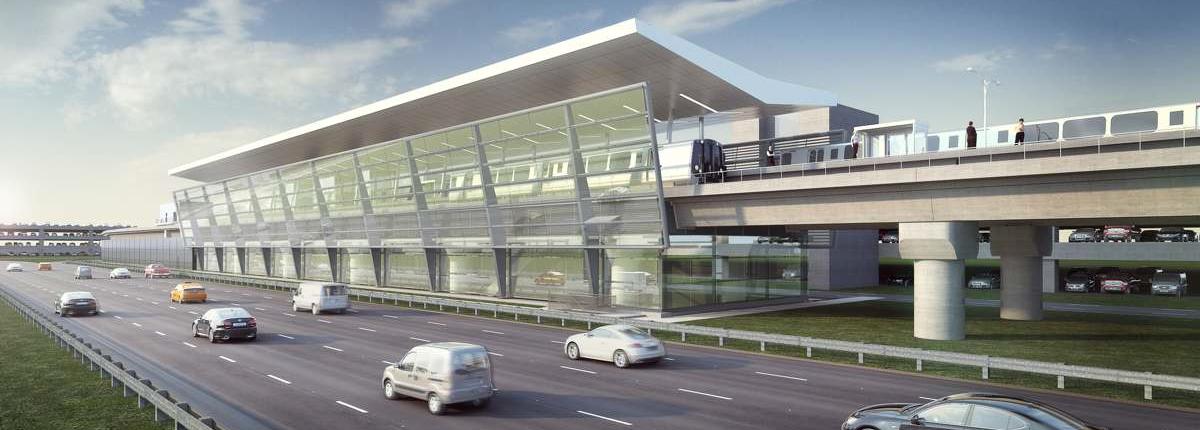
Few take the road less traveled. It requires a certain mindset – dedication, hard work, and the unwavering belief that it will lead to the right destination. Scott Moore, 58, has always taken the road less traveled. As general superintendent, the 19-year Clark Construction veteran and native Texan now manages the entire Silver Line Phase 2 project. Overseeing a civil engineering construction project that includes six stations and 11 miles of rail requires a strong work ethic and a keen eye for detail. Over the years, experience has honed his eye for the nuance that matters on projects of this scope. Moore also finds time to mentor colleagues while ensuring safety and quality remain their focus.
How’d you get into construction? My stepdad was in the civil construction business – loaders, dump trucks, dozers, and graders. I grew up around all of that equipment and that type of work. And as I got old enough to be a workhand, I was out working. I liked the trade and I liked the business. Later, my dad bought an old house and we added onto it. I got really involved – wood work, carpentry work. I had a knack for it. So, when I got out of school, I worked for my dad a little bit when he needed an extra hand and then I started my own business building houses.
Tell me about what you do for CRC on the Silver Line Phase 2. We have six stations spread out over 13 miles of track, and there is a superintendent or assistant superintendent managing each station. My job is to manage those people. I actually help get the station built. I manage the subs. I manage the CRC folks. And then I always consider myself as kind of straddling the fence, from the office to the field. I’ve got to push on the office to give me what I need in the field to get things built. Then, I work with the field to actually go out and get it built.
What do you like best about working on this project? There is always something new. This job is different in a lot of ways compared with the other jobs I’ve done. We self-perform a lot of work here from the civil side to getting involved in putting down rail. I can say I’ve done it all now.
Do any personal successes on this project stand out? I thrive on giving back. Working with the younger generation to ensure they leave this project with something that will help them and advance their careers. That’s really rewarding for me.
You get to be a mentor? Absolutely. On a daily basis. And that is one of the things that motivates me every day.
You’re also part of a project that’s in our nation’s capital, that’s going to have a great impact for a long time. How does being part of that make you feel? It’s satisfying. I’ve built hospitals — two military hospitals, one county hospital out in California. To know that those hospitals save lives – that’s rewarding, right? To me that’s just like the Silver Line [Phase 2]. I know when I get done here, there will be people who will use these trains to get from one place to the other for years to come. And it’s the fruits of my labor that will serve a purpose for a lot of people. Definitely a sense of pride and a lot of self-satisfaction. And it’s fun.

You have a passion for this project. Absolutely. It’s not always easy to find your passion. But when you find it, it is so rewarding. My advice to anyone searching for their passion is to find what you really want to do. I can tell you, over my years, I’ve searched for that right place. I tell people that the roads I’ve traveled and the different turns that I made have all led me to where I am. And it’s made me a better superintendent, a better builder. I’m where I’m supposed to be.
You’ve got decades of experience in construction. When you think about the Silver Line Phase 2 project in terms of safety and quality, how does it stand out in your mind compared with some of the other work sites you’ve been on? No matter what job I’m on, safety’s first. Without safety, without quality, you just don’t have a job. It’s personal to me that everyone who walks in on my job leaves the way they came in. I go out of my way to get to know everyone on a job. That personal interaction with people means a lot. Quality… that goes back to pride. If you just go out, throw something up and you don’t care what you doing, how can you have any pride? Every job that I’m a part of, safety and quality are first and foremost.

When this project wraps up soon, how will you know it’s a success? Success would be seeing people on the train, doing their thing, commuting. That’s what it’s for. Success is also seeing others move on to their next jobs, advance in their careers to be what I know they’re going to be. That’s the long-term success.
Those future commuters… what would you like them to know about the work that went into building the Silver Line Phase 2? There have been a lot of people working extremely hard to get this job completed, and with quality in mind, to give them a safe system to commute to whatever destination they’re going to. It’s taken a lot of people, a lot of hard work, and putting a lot of pride in what they’re doing to make this happen. And it’s not just a job – it’s looking out for one another. When this job is done, I’ll leave here with some great friendships that I will carry on ‘til the end of time.
